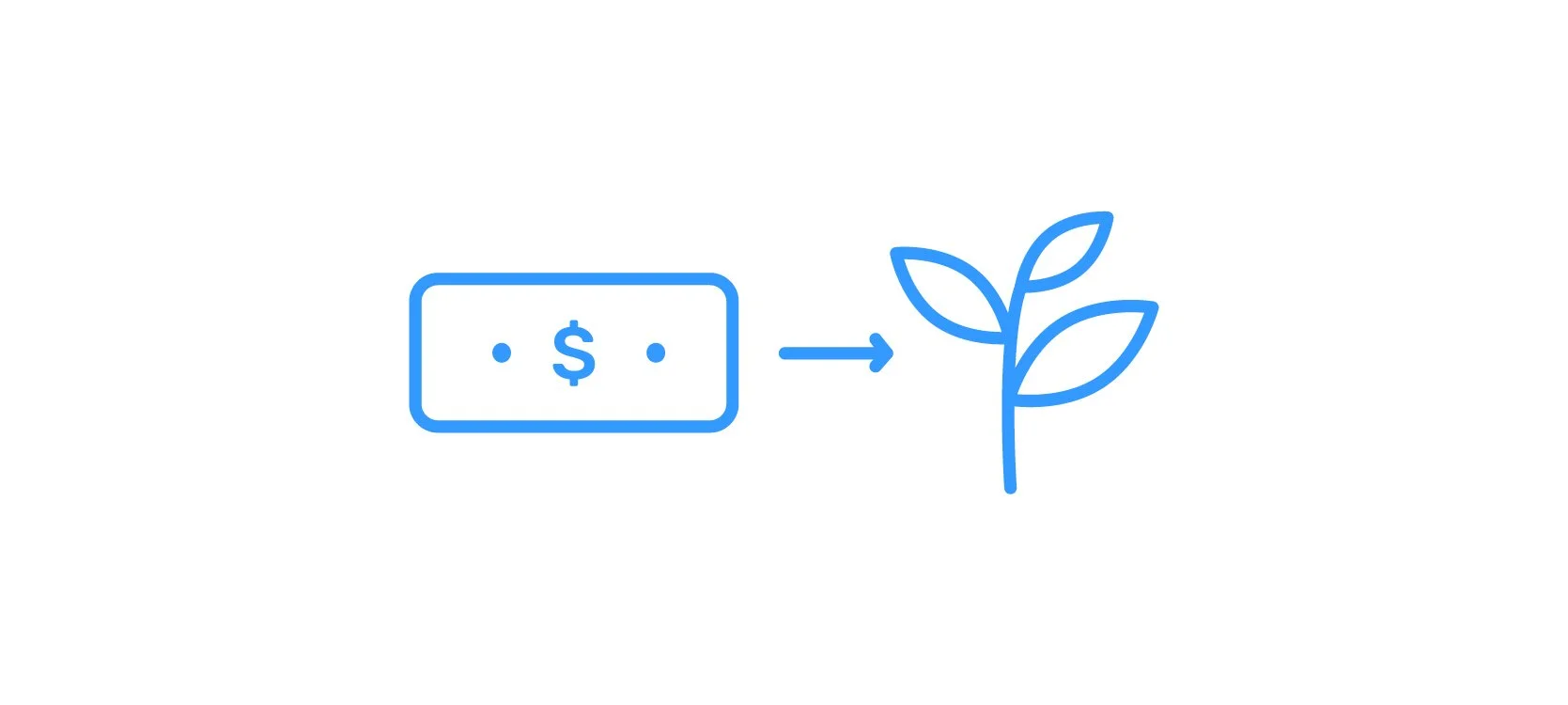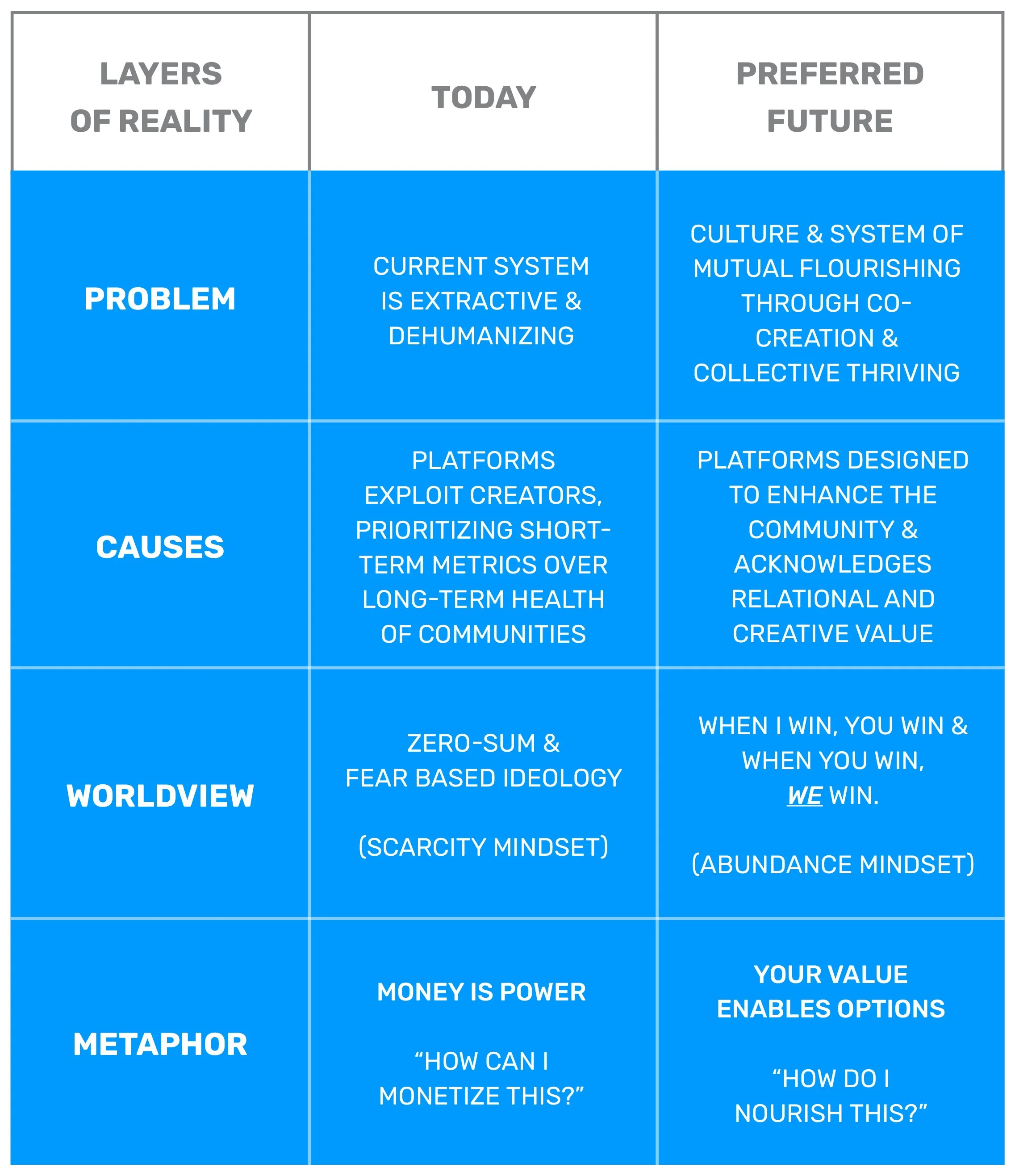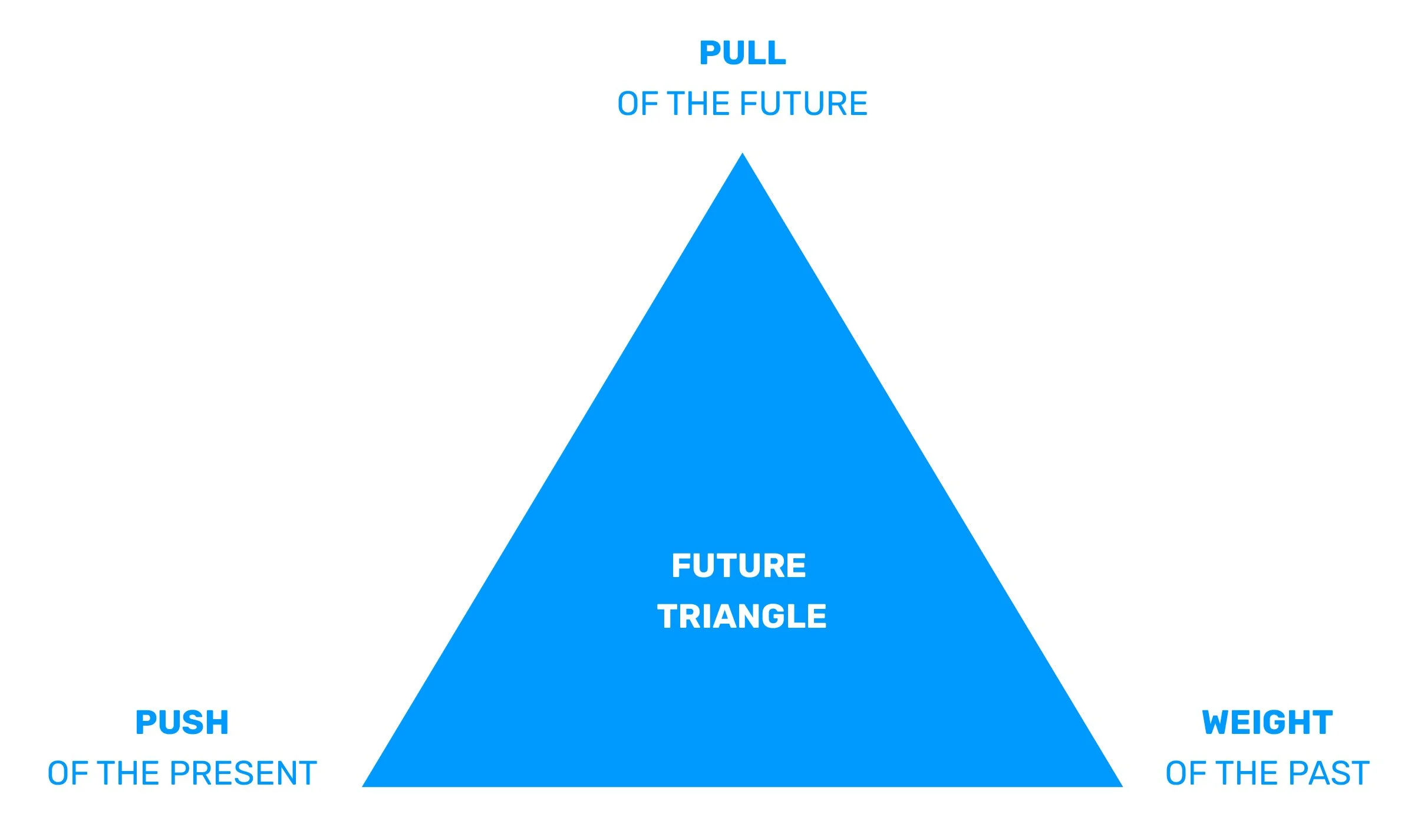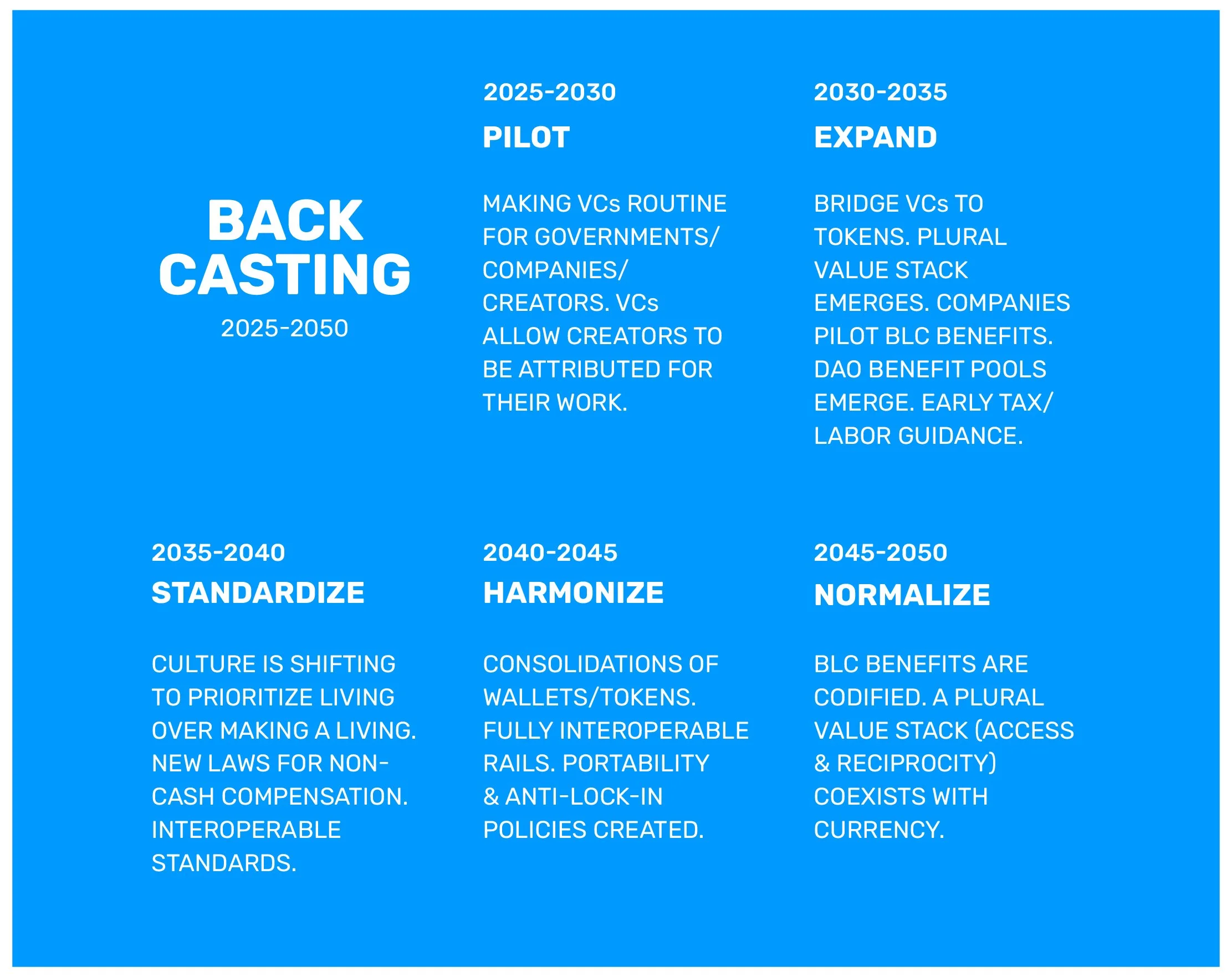The year is 2050. You wake up in a home you don't own. You open a fridge full of food you didn't pay for. You get dressed in clothes dropped off for this month's wardrobe service, which is part of a subscription you don't pay for. You use mobility credits that give you a variety of transportation options (vehicle rides/rentals, public transit, scooters/bike shares) that will take you anywhere in the city zones. All of these services are benefits associated with tokens in your wallet portfolio. The tokens for housing and food are tied to your primary work token. Access to your wardrobe subscription is associated with one of your DAO tokens, and the mobility benefits are tied to credits earned from the city for performing civic services and contributions.
It's important to note that traditional fiat currency will not be dead. You may still receive a salary as part of your compensation package, but it will be rare for one to choose employment or projects solely based on pay. The world is becoming more interesting in terms of how individuals, businesses, and brands decide to compensate others for their value. The use of the term 'others' was intentional to reference the fact that, in this emerging future, machines or autonomous systems may be part of this new ecosystem of exchange and may also require forms of trade (some monetary, others perhaps various non-monetary means of value).
For centuries, money has been the dominant tool used for compensation. However, new tools are emerging, allowing for more creative and compelling alternatives, especially for young brands, companies, systems, and individuals. This shift empowers individuals to choose projects and employment opportunities that align with their values, rather than solely based on compensation, inspiring a more hopeful future. This may sound like a fantasy. The concepts feel as foreign as today's base technology and culture would sound to someone in the 1980s. Still, these concepts are based on technology and the seeds of change emerging from today's horizon scanning, which are quietly shifting the landscape for how people work, earn, and transact.
This paper explores the evolution of compensation and value exchange, which is shifting from a measure of productivity to a reflection of alignment, access, and contribution. These shifts are transforming the very foundation of our economies. From extractive systems, measured by productivity and anchored in a scarcity mindset, to systems of collective growth, access, and contribution, rooted in an abundance mindset that values nourishment and mutual flourishing.
Moving From Extractive To Nourishing
Money is one of the most powerful inventions in human history. Yet, at its most basic, money is simply a means of exchange. We often forget that. A system designed to solve practical problems and standardize trade. It's non-perishable, divisible, and portable. There is a beauty to it. However, it has also created massive systemic issues of wealth inequality, social division, and exploitation of labor, not to mention the psychological impacts.
Now, compensation is much broader than money. It's the mechanisms we use to acknowledge and reward contributions. Compensation models that predominantly rely on currency as the reward or exchange are the basis for extractive economics. Extractive systems are frameworks that prioritize profit, wealth accumulation, and the exploitation of resources. They are designed to excavate value with little focus on replenishing their source.
Imagine a world where economies are no longer extractive but nourishing. To understand the profound shift from extractive to nourishing economics that is emerging between now and the mid-century, I utilize the Causal Layer Analysis (CLA) futures method to examine the problem, systemic causes, underlying worldviews, and metaphors shaping this transition.
First, the base problem is that the majority of systems we use for value exchange today are based on extractive economics, meaning they are designed to extract value and energy from people, resources, communities, and cultures. These structures are often driven by short-term financial gain and frequently ignore long-term consequences. Much of the problem stems from the corruption and deterioration of how we measure value and how we compensate or reward contributions.
The next layer beneath the problem is discovering the systems that perpetuate extractive economies. Platforms exploit creators, prioritizing short-term metrics over the long-term health of their communities. Systems reward measurable output, ignoring subtle human contributions. So the top C-suite executives get richer, and the "worker bees" get raises that barely match inflation anymore. The value propositions feel imbalanced.
These extractive systems have fostered a worldview of zero-sum, fear-based ideology, where one's gain is another's loss. Many people end up feeling like they are just a cog in the system. These views are being driven by the metaphor that "Money is power." Yet there is an exciting change afoot. Today's metaphor is shifting from "money is power," where one may ask, "How can I monetize this?" to the emerging future metaphor that "your value enables options," and one asks, "How can I nourish this?" That emerging metaphor will fundamentally alter each layer of reality.
So the worldviews in this emerging future will be based on positive-sum thinking or an abundance mindset. There is an essential belief: "when I win, you win and when you win, we win." It builds a culture of mutual flourishing through co-creation. This will lead to the development of new business models and systems built on transparent reciprocal value exchange.
People will choose projects and employment opportunities based on alignment with their values, rather than solely on monetary compensation. They will look for areas they can pour themselves into, rather than focusing on what they get out of it. There will be platforms designed to enhance the community through collective thriving. With technologies like smart contracts, subconscious AI, and quantum computing, systems will focus more on compensation that acknowledges relational and creative value, while also providing contextual awareness of people's situations and desired incentives.
The Future Triangle
While the CLA tool helps us understand the different layers of reality for today, enabling us to better define a preferred or emerging future, it's only a portion of the picture. Another tool that helps us understand the elements at play in this current shifting landscape is the future triangle. This tool helps define the current components in motion. It helps clarify drivers or push of the present, identify barriers or weight of the past, and lastly, ambitions and visions that pull us into this future. Each area informs a portion of this emerging future.
Pushes: First, let's break down the drivers. Programmable Value Agreements (Smart contracts) and Decentralized Autonomous Organizations (DAOs) are two key technologies that make this emerging future possible. These technological advancements are not just tools, but new ways of approaching how we architect and engineer the new economic systems. The last piece around decentralized technology is Verifiable Credentials (VC). They are cryptographically signed tokens that serve as digital equivalents of today's physical credentials, such as passports or licenses. VCs are the central key that allows DAOs and smart contracts to become beneficial.
The next driver, adding to this, is the new wave of AI that is reshaping our culture and societies daily. Over the next 2-3 decades, we will see the emergence of what I refer to as embedded subconscious AI. By that, I liken it to how you or I don't knowingly think about breathing, or having the heart pump blood throughout the body, or a million other things the human body independently does every second on a molecular level to allow me to stay alive. As we begin to unlock this new ability with systems containing subconscious AI, children of tomorrow will be able to craft whole new ecosystems that are unimaginable to even the most creative minds today.
Weights: Now, let's examine the weight of the past that holds us back. One of the glaring issues slowing innovation in this space currently is tax and AML compliance. Government systems are primarily built around economies based on money. This is a very valid barrier. We have spent hundreds of years refining our society predominantly around money-based exchanges and building in necessary protections.
That is one of the most glaring barriers. Still, it is manageable compared to the deep cultural attachment to money and salary as a direct tie to security and stability, both personally and politically. It will likely be presented as a generational rift that leaves older generations tied to perceived securities.
Last but not least, corporations and institutional resistance could dramatically slow or weaken new models for compensation. Banks and investment firms have a vested interest in maintaining traditional monetary exchanges. Also, exchanges are only as good as the participants. For non-monetary exchanges to ever reach ubiquity, companies must also participate in them. Otherwise, it's like having the first telephone with no one on the other end to pick up.
Pulls: Lastly, let's explore the ambitions and promises of the future that keep pulling us forward. The loudest signal moving us forward is the paradigm shift from younger generations (Millennials, Gen Z, Gen Alpha) who strongly value meaning and collective flourishing over traditional individual wealth accumulation. They are not as driven by money as previous eras. The concept of waiting until retirement to enjoy life or needing to "pay your dues" before having an impact on a group or organization has always felt foreign.
On that same note, another pull to the future is the growing focus on the quality of life beyond salaries and incomes. We are realizing that physical, mental, emotional, and spiritual health collectively comprise an individual's overall quality of life. There is a growing drive for whole nourishment, care, and reciprocity over maximizing profits or incomes. Added to this is the increasing awareness of wealth disparity and rising inflation. There is a growing desire for greater balance in economic exchanges.
Work Environments In A Nourishing Economy
As we transition to systems designed for nourishment rather than monetization, there is a significant shift in how we work within the new economies. The future of work isn't paid in crypto, it's lived in covered essentials. It's shifting the focus and culture from "working to live" to "nourishing and flourishing together."
Much of the narrative in this new landscape focuses more on shared thriving rather than perks and bonuses. Moving from legacy payrolls, with a focus on competitive salaries, employers will begin to promote Basic Living Coverage (BLC), value alignment, and shared equity. For governments, there are significant opportunities to establish new partnerships that foster greater community or city engagement, incentivizing certain activities in exchange for access to city services. For example, mentoring could be exchanged for public transportation passes. Again, returning to the idea of mutual flourishing, rather than compensating in money, access to city or community services can be earned or unlocked through communal actions. For example, by volunteering time and service in a garden, you can earn food tokens redeemable at the corresponding local grocery store.
Moving forward, we will transition away from generalized value to a more hyper-specific and contextual value compensation. We will begin to see the blurred lines between life and livelihood. This notion has already been at play since the rise of the "dot com" era, but it is becoming more the expectation than the exception.
Creators as EconomIES OF ONE
All of this gravitates around the notion that in this emerging future, creators are seen as economic engines. We are on the verge of an era where many of the top-valued companies will be run by a small team of human workers who organize and orchestrate billion-dollar enterprises. Individuals will become their own economy of meaning.
We have already seen signs of this trend emerging during the rise of social media. What started as a simple "follow" or "view" on social media has since evolved into a presence or brand for millions. Social media has completely shifted the playing field. It enabled millions of people who never considered themselves creative to now express their creativity. Thus, realizing that creativity unlocks everything. This seemingly benign shift, which has been happening for the last decade, quietly transformed creators from being a cog in a system to becoming their own system.
As we transition from laborers to originators, individuals generate new categories of value. Creators don't just perform tasks; they become transformative nodes. It's not just what they do but who they are and how they transform everything that passes through them. In this emerging future, a significant shift is that creators or originators will no longer be tied to strictly monetary systems when it comes to compensation or exchange. They will have the ability to create unique, hyperspecific systems for determining how they compensate others and how others can compensate them.
And if that isn't massive enough, they will also be able to be compensated for much of what we refer to today as "intangibles." Things like your resonance in a community, being known as a "connector" in an ecosystem, or even performing random acts of kindness. Today, compensation is often reduced to monetary measures. Yet, the most interesting aspect in this emerging future for true originators will be discovered in unleashing their creativity on the seemingly limitless possibilities of creating non-monetary, non-systematic, hyper-specific, and personal forms of exchange.
Getting from here to there
So how do we bridge the gap? How do we get to this alternative future? One of the most critical parts of peering into the future is building paths that help bring a vision to life. Through the backcasting exercise, we begin in this alternative future and move backwards towards today, identifying key milestones at each stage. Backcasting from 2050 makes the path concrete. At a high level, the transition begins with the initial phase of piloting concepts now, then standardize by the mid-30s, harmonize in the early-40s, and normalize by 2050. Like the saying, "Rome wasn't built in a day," we must realize that this new world will materialize through small movements over decades.
In the near term (2025-2030), the focus is primarily on verifiable credentials (VCs). We can already see major signals at work, such as California's Digital ID Framework, which enables residents to prove their identity/eligibility once and reuse it across agencies. Additionally, Apple recently added support for mobile driver's licenses/state ID VCs to the Apple Wallet. Or how software like Adobe Photoshop is adding credentialing for creative work, allowing artists and creators to be attributed for their work. Moving forward, creator economies will start to use VCs to attest to contribution. We'll see a culture shift from "how much I made on a project" to "what I contributed to a project," thus instigating a mental transition from monetization to nourishment.
Through the 30s, credentials will bridge into compensation. This will feel like the decade of new. There will be a collective sense that everyone is trying to rethink old things in new ways. Companies begin to convert traditional benefits to smart contracts (Health Insurance, PTO, EAP services). Creator DAOs are gaining popularity as a means to establish shared benefit or entitlement pools via VC-gated smart contracts, catering to the growing creator economy and gig workers. Companies are beginning to market new "benefit bundles" as Basic Living Coverage (BLCs), creating new benefit offerings with reduced focus on salary (like housing-included, grocery credits, mobility tokens).
Early post-quantum pilots harden wallets and improve rails. Policies are catching up, developing guidance and laws around tax and non-cash compensation. With Gen Alpha entering the workforce, culture begins to shift away from a money-focused mentality and leans into access. In that same vein, society moves its focus from "how do I make money" to "how do I make memories," prioritizing living over making a living. People start asking, "What projects are you nourishing right now?" Where are you pouring your attention?" Everywhere you look, there is a new wallet with new tokens and new benefits. This will create a cognitive load by the end of the 30s, but will also prompt the beginning of consolidation and improvement.
By the 2040s, the focus shifts to harmonize and normalize. There is a consolidation of wallets and tokens. We have fully interoperable rails, enabling people to use tokens across different jobs and cities. Lifestyle ledgers become commonplace (token access to basic resources like food, shelter, transportation). Portability and anti-lock-in policies are created to protect from vendor or employer capture. A national poly-value index is designed to track cash and non-cash flows, helping to better account for the value individuals and entities hold. BLC benefits are codified and become commonplace. The outcome by 2050 isn't the end of money. It is the maturing of it as we transition to a plural value stack where access and reciprocity coexist with currency. Now, creators and communities can choose work centered on alignment and shared flourishing.
Conclusion
As I stated earlier, the concepts I presented seem like science fiction at first glance. Yet, as I have demonstrated, these notions are grounded in current technology and emerging signals, which are reshaping how we work, earn, and transact with each other and autonomous systems. These shifts are transforming our economies from systems designed to extract at all costs to ones rooted in an abundance mindset that values nourishment and mutual flourishing.
Yet, the weights holding us back are deep. Both the cultural ties to money and salary, along with the high complexity of tax and government regulations, will pose significant challenges. However, technologies such as smart contracts, DAOs, and AI ecosystems are forming foundational capabilities that will likely be used to address some of these concerns. Likewise, generational shifts in our culture with a growing emphasis on quality of life may help us heal from the generational trauma caused in part by money-driven systems. The result of which may establish environments that foster the evolution of new societal ideas and aspirations for the future.
Moving forward, we will continue to see the blurring of the lines between life and livelihood. The focus is shifting from a salary-centric approach to a more Basic Living Coverage approach, with an emphasis on mutual flourishing. Today, compensation is often reduced to monetary measures. Yet, the most interesting aspect of this emerging future for true originators will be exploring the seemingly limitless creative possibilities of crafting unique, non-monetary, non-systematic, hyper-specific, and personal forms of exchange and compensation. What an exciting time to be alive. The future is never dull for a creative mind.




